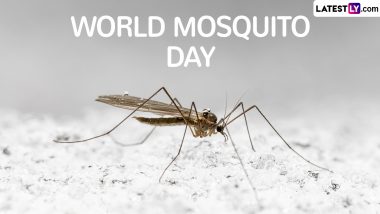World Mosquito Day, observed on August 20, brings global attention to the significant role mosquitoes play in spreading diseases. Through various events, campaigns, and educational activities, this day aims to draw attention to the dangers posed by mosquitoes and the strides being made to mitigate these threats. Mosquitoes are more than just a nuisance; they are vectors for a range of serious illnesses that affect millions of people worldwide. Here’s a look at some of the major diseases caused by mosquitoes:
Malaria
- Caused by: Plasmodium parasites
- Vector: Anopheles mosquitoes
- Symptoms: Fever, chills, headache, and flu-like symptoms
- Impact: Malaria remains one of the most serious mosquito-borne diseases, with hundreds of millions of cases and hundreds of thousands of deaths each year, predominantly in sub-Saharan Africa. Effective treatment and prevention methods include insecticide-treated nets and antimalarial medications.
Dengue Fever
- Caused by: Dengue virus
- Vector: Aedes mosquitoes, especially Aedes aegypti
- Symptoms: High fever, severe headache, retro-orbital pain, muscle and joint pain, rash, and bleeding.
- Impact: Dengue fever is common in tropical and subtropical regions. Severe cases, known as dengue hemorrhagic fever (DHF) or dengue shock syndrome (DSS), can be life-threatening. There is currently no specific treatment, but prevention efforts focus on mosquito control and, in some areas, vaccination.
Zika Virus
- Caused by: Zika virus
- Vector: Aedes mosquitoes, primarily Aedes aegypti
- Symptoms: Mild fever, rash, joint pain, and conjunctivitis
- Impact: Zika virus is particularly concerning for pregnant women as it can cause microcephaly and other severe birth defects in babies. The outbreak of
- Zika virus in 2015-2016 highlighted the need for mosquito control and research into vaccines.
Chikungunya
- Caused by: Chikungunya virus
- Vector: Aedes mosquitoes, especially Aedes aegypti and Aedes albopictus
- Symptoms: High fever, severe joint pain, muscle pain, and rash
- Impact: Chikungunya virus primarily affects tropical and subtropical regions.
- While not usually fatal, the joint pain can persist for months or even years, impacting the quality of life. Prevention focuses on avoiding mosquito bites and controlling mosquito populations.
Yellow Fever
- Caused by: An arbovirus
- Vector: Aedes and Haemagogus mosquitoes
- Symptoms: Fever, chills, loss of appetite, muscle pain, and nausea. Severe cases can lead to liver damage and bleeding.
- Impact: Yellow fever is endemic in parts of Africa and South America.
- Vaccination is highly effective and is the primary method of prevention. The disease can be severe, with a significant fatality rate if not managed properly.
West Nile Virus
- Caused by: West Nile virus
- Vector: Culex mosquitoes
- Symptoms: Often asymptomatic or mild, but can include fever, headache, body aches, and occasionally severe neurological symptoms
- Impact: West Nile virus is found in various parts of the world, including North America, Europe, and Africa. Most infections are mild, but severe cases can lead to encephalitis or meningitis, particularly in older adults.
World Mosquito Day serves as a reminder of the critical role mosquitoes play in transmitting these serious diseases. Understanding the various diseases caused by mosquitoes helps in developing effective prevention and control strategies. Continued research, public health initiatives, and community efforts are essential in reducing the burden of these mosquito-borne illnesses and improving global health.
(This article is written for an informative purpose and should not be substituted for medical advice. Kindly consult your doctor before trying any tips.)
(The above story first appeared on LatestLY on Aug 19, 2024 02:37 PM IST. For more news and updates on politics, world, sports, entertainment and lifestyle, log on to our website latestly.com).













 Quickly
Quickly





















